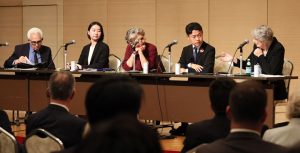Former world leaders and youth from A-bombed cities exchange views in Hiroshima, sounding alarm on current nuclear status
May 14, 2025
by Kana Kobayashi, Staff Writer
On May 13, the Elders, an international humanitarian group founded by former South African President Nelson Mandela, held a symposium at the International Conference Center Hiroshima in Naka Ward, Hiroshima. Former world leaders, who are members of the Elders, and young people from atomic-bombed cities exchanged views on the current status of nuclear weapons.
Former New Zealand Prime Minister Helen Clark emphasized the importance of remembering the words never to repeat war, as this year marks the 80th anniversary of the atomic bombing. She urged this commitment be upheld in light of rising tension between India and Pakistan, both nuclear weapon states.
Speaking on behalf of young people, Keita Takagaki, 22, an advocate for nuclear abolition from Asaminami Ward in Hiroshima, and Yukino Yamaguchi, 22, a college student from Nagasaki, took the stage. Mr. Takagaki pointed out numerous unidentified remains are still enshrined in the Atomic Bomb Memorial Mound in Peace Memorial Park, saying, “We have to pass down the fact that suffering caused by the A-bombing continues even now, along with A-bomb survivors’ testimonies and experiences.”
At the closing of the symposium, former United Nations Secretary-General Ban Ki-moon expressed his hope that Japan, as the only country to have suffered A-bombings, would be more closely involved in the Treaty on the Prohibition of Nuclear Weapons (TPNW) and participate as an observer during its meetings.
The symposium was cosponsored by the Hiroshima Organization for Global Peace (HOPe), Hiroshima Prefecture public-private partnership, and the Hiroshima Office of the United Nations Institute for Training and Research (UNITAR). Approximately 150 people, including local citizens, took part.
(Originally published on May 14, 2025)
On May 13, the Elders, an international humanitarian group founded by former South African President Nelson Mandela, held a symposium at the International Conference Center Hiroshima in Naka Ward, Hiroshima. Former world leaders, who are members of the Elders, and young people from atomic-bombed cities exchanged views on the current status of nuclear weapons.
Former New Zealand Prime Minister Helen Clark emphasized the importance of remembering the words never to repeat war, as this year marks the 80th anniversary of the atomic bombing. She urged this commitment be upheld in light of rising tension between India and Pakistan, both nuclear weapon states.
Speaking on behalf of young people, Keita Takagaki, 22, an advocate for nuclear abolition from Asaminami Ward in Hiroshima, and Yukino Yamaguchi, 22, a college student from Nagasaki, took the stage. Mr. Takagaki pointed out numerous unidentified remains are still enshrined in the Atomic Bomb Memorial Mound in Peace Memorial Park, saying, “We have to pass down the fact that suffering caused by the A-bombing continues even now, along with A-bomb survivors’ testimonies and experiences.”
At the closing of the symposium, former United Nations Secretary-General Ban Ki-moon expressed his hope that Japan, as the only country to have suffered A-bombings, would be more closely involved in the Treaty on the Prohibition of Nuclear Weapons (TPNW) and participate as an observer during its meetings.
The symposium was cosponsored by the Hiroshima Organization for Global Peace (HOPe), Hiroshima Prefecture public-private partnership, and the Hiroshima Office of the United Nations Institute for Training and Research (UNITAR). Approximately 150 people, including local citizens, took part.
(Originally published on May 14, 2025)








